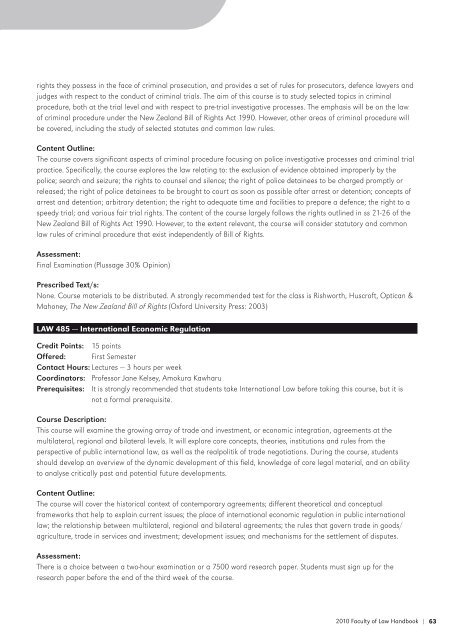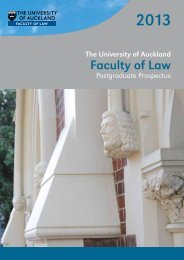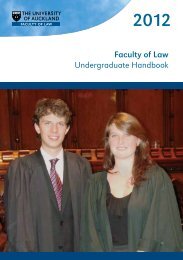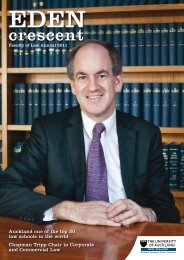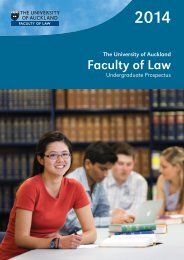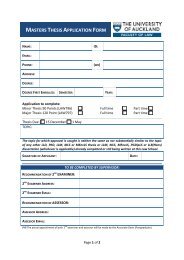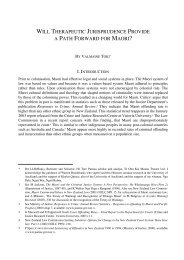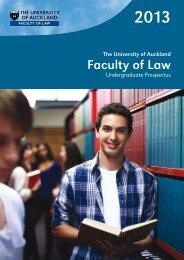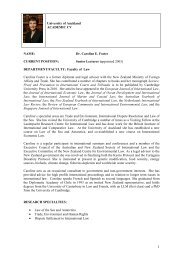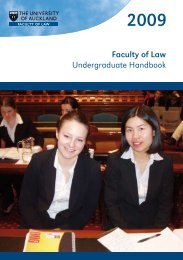Faculty of Law Undergraduate Handbook - Faculty of Law - The ...
Faculty of Law Undergraduate Handbook - Faculty of Law - The ...
Faculty of Law Undergraduate Handbook - Faculty of Law - The ...
- No tags were found...
You also want an ePaper? Increase the reach of your titles
YUMPU automatically turns print PDFs into web optimized ePapers that Google loves.
ights they possess in the face <strong>of</strong> criminal prosecution, and provides a set <strong>of</strong> rules for prosecutors, defence lawyers andjudges with respect to the conduct <strong>of</strong> criminal trials. <strong>The</strong> aim <strong>of</strong> this course is to study selected topics in criminalprocedure, both at the trial level and with respect to pre-trial investigative processes. <strong>The</strong> emphasis will be on the law<strong>of</strong> criminal procedure under the New Zealand Bill <strong>of</strong> Rights Act 1990. However, other areas <strong>of</strong> criminal procedure willbe covered, including the study <strong>of</strong> selected statutes and common law rules.Content Outline:<strong>The</strong> course covers significant aspects <strong>of</strong> criminal procedure focusing on police investigative processes and criminal trialpractice. Specifically, the course explores the law relating to: the exclusion <strong>of</strong> evidence obtained improperly by thepolice; search and seizure; the rights to counsel and silence; the right <strong>of</strong> police detainees to be charged promptly orreleased; the right <strong>of</strong> police detainees to be brought to court as soon as possible after arrest or detention; concepts <strong>of</strong>arrest and detention; arbitrary detention; the right to adequate time and facilities to prepare a defence; the right to aspeedy trial; and various fair trial rights. <strong>The</strong> content <strong>of</strong> the course largely follows the rights outlined in ss 21-26 <strong>of</strong> theNew Zealand Bill <strong>of</strong> Rights Act 1990. However, to the extent relevant, the course will consider statutory and commonlaw rules <strong>of</strong> criminal procedure that exist independently <strong>of</strong> Bill <strong>of</strong> Rights.Assessment:Final Examination (Plussage 30% Opinion)Prescribed Text/s:None. Course materials to be distributed. A strongly recommended text for the class is Rishworth, Huscr<strong>of</strong>t, Optican &Mahoney, <strong>The</strong> New Zealand Bill <strong>of</strong> Rights (Oxford University Press: 2003)LAW 485 — International Economic RegulationCredit Points: 15 pointsOffered: First SemesterContact Hours: Lectures — 3 hours per weekCoordinators: Pr<strong>of</strong>essor Jane Kelsey, Amokura KawharuPrerequisites: It is strongly recommended that students take International <strong>Law</strong> before taking this course, but it isnot a formal prerequisite.Course Description:This course will examine the growing array <strong>of</strong> trade and investment, or economic integration, agreements at themultilateral, regional and bilateral levels. It will explore core concepts, theories, institutions and rules from theperspective <strong>of</strong> public international law, as well as the realpolitik <strong>of</strong> trade negotiations. During the course, studentsshould develop an overview <strong>of</strong> the dynamic development <strong>of</strong> this field, knowledge <strong>of</strong> core legal material, and an abilityto analyse critically past and potential future developments.Content Outline:<strong>The</strong> course will cover the historical context <strong>of</strong> contemporary agreements; different theoretical and conceptualframeworks that help to explain current issues; the place <strong>of</strong> international economic regulation in public internationallaw; the relationship between multilateral, regional and bilateral agreements; the rules that govern trade in goods/agriculture, trade in services and investment; development issues; and mechanisms for the settlement <strong>of</strong> disputes.Assessment:<strong>The</strong>re is a choice between a two-hour examination or a 7500 word research paper. Students must sign up for theresearch paper before the end <strong>of</strong> the third week <strong>of</strong> the course.2010 <strong>Faculty</strong> <strong>of</strong> <strong>Law</strong> <strong>Handbook</strong> | 63


